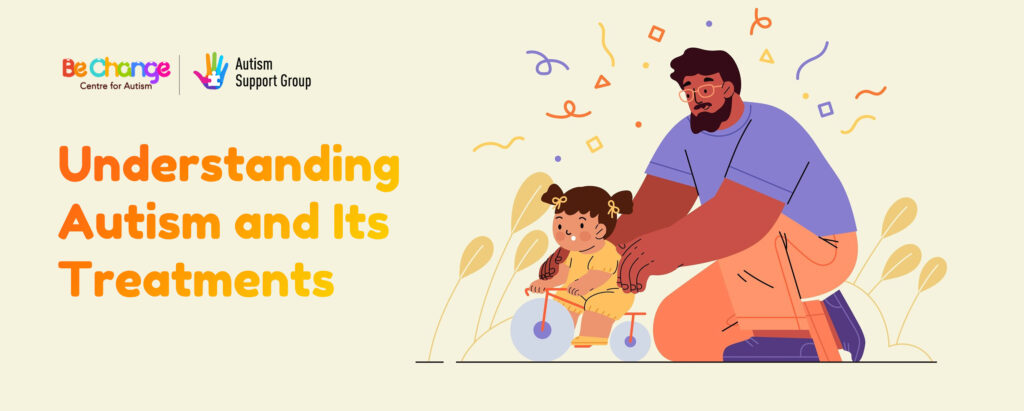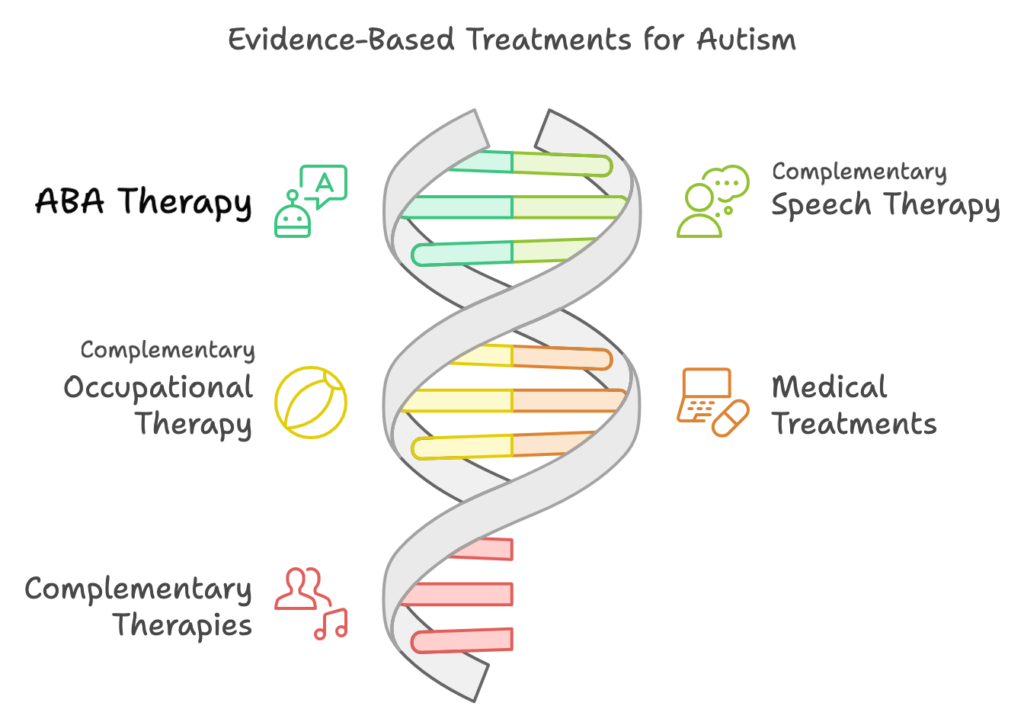
Introduction to Autism Spectrum Disorder (ASD)
Autism Spectrum Disorder (ASD) is a broad neurodevelopmental disorder that impacts social communication, repetitive behaviors, and sometimes cognitive functioning. Unlike many other conditions, autism is known as a “spectrum” disorder because it affects individuals differently; each person with autism has a unique set of strengths and challenges. This spectrum nature means treatments must be as individualized as the people they serve, often involving a combination of therapies, strategies, and support systems. As ABA therapists, we believe in an evidence-based approach to create impactful, personalized strategies to empower individuals, helping them thrive in their social, academic, and personal lives.
Autism generally presents in early childhood, and recognizing early signs can lead to earlier intervention, which ABA therapy and research show is associated with better outcomes over time. This post explores what autism is, its causes, symptoms across age groups, and how tailored treatments, including ABA, can play a transformative role in individuals’ lives.
Join Autism Support Community in Facebook
Causes and Risk Factors of Autism
Autism’s exact causes are not fully understood, but current research points to a complex interaction of genetic and environmental factors. Genetics appear to play a significant role, with specific gene mutations and familial patterns sometimes observed in autism diagnoses. For instance, some studies suggest that if a family has one child with autism, there’s an increased likelihood for siblings to also be on the spectrum.
Environmental factors—such as advanced parental age, prenatal exposure to toxins, or low birth weight—have also been identified as potential risk factors. These factors do not “cause” autism directly but may contribute to the likelihood when paired with certain genetic predispositions. Importantly, one misconception to dispel is the link between vaccines and autism; no scientific evidence supports this theory. A clear understanding of what causes autism (and what does not) helps families and practitioners focus on effective, evidence-based care.
Recognizing the Signs and Symptoms
Recognizing autism involves looking at a range of behaviors, as signs can vary significantly depending on age, severity, and the individual’s characteristics. Common symptoms of autism include:
- Early Signs in Infants and Toddlers: Limited eye contact, a lack of response to name, delayed speech or language skills, and repetitive behaviors (e.g., flapping hands, lining up toys). Some young children may appear to “lose” skills previously mastered, which can be an early red flag for ASD.
- Symptoms in Older Children: Social difficulties become more noticeable, such as difficulty with peer interactions, a preference for routines, and sensitivity to sensory stimuli (like loud sounds or bright lights). Older children may also exhibit repetitive speech or interests and find it challenging to adjust to new activities or changes in routine.
- Adolescents and Adults: Older individuals on the spectrum may face social challenges like maintaining friendships, managing sensory overload, and developing independence. Behavioral analysis can help them learn skills to navigate these challenges by breaking down tasks into manageable steps.
Understanding these signs can guide families in seeking early assessments and support, which we know is vital in promoting positive outcomes.
Screening and Diagnosis
Diagnosing autism is a process that involves several steps, including initial screenings and comprehensive evaluations. Pediatricians often conduct first-level screenings during well-child visits to detect developmental delays. Tools like the Modified Checklist for Autism in Toddlers (M-CHAT) help identify early signs. If a screening suggests possible autism, a more detailed evaluation is conducted by specialists.
A comprehensive diagnosis typically involves assessments from multiple professionals (psychologists, neurologists, ABA specialists) who observe behaviors, assess social interactions, and collect developmental history. These evaluations are essential for building a clear picture of the individual’s needs, forming the foundation of a treatment plan tailored to help them reach their potential.
Evidence-Based Treatments for Autism
- Applied Behavior Analysis (ABA) Therapy: ABA is one of the most widely recognized and evidence-based approaches to autism treatment. Through principles like reinforcement, ABA teaches socially significant behaviors, communication, and adaptive skills. ABA’s data-driven approach allows therapists to measure progress and adjust strategies to keep up with an individual’s evolving needs. Techniques commonly used include:
- Discrete Trial Training (DTT): Breaking down tasks into small, teachable components and rewarding successful completion.
- Natural Environment Training (NET): Teaching skills in natural settings to help the individual generalize abilities across different contexts.
- Functional Behavior Analysis (FBA): Identifying the reasons behind challenging behaviors and creating strategies to reduce them while promoting adaptive behaviors.
- Speech and Language Therapy: Communication challenges are common in autism, and speech therapy helps develop skills needed for functional language and social communication. Therapists use techniques that align with the individual’s cognitive and verbal abilities, including alternative communication methods like sign language or AAC (augmentative and alternative communication) devices for those who are non-verbal.
- Occupational Therapy (OT): Many individuals with autism experience difficulties with sensory processing and fine motor skills. Occupational therapy focuses on helping individuals participate fully in daily activities, from personal care to school tasks. OTs often work closely with ABA therapists to create sensory-friendly environments and enhance learning.
- Medical and Pharmacological Treatments: While no medication can “cure” autism, medications can help manage co-occurring conditions, such as anxiety or ADHD, which may interfere with therapy. Medication decisions are typically made by a medical professional in collaboration with the individual’s therapy team.
- Complementary Therapies: Music therapy, art therapy, and animal-assisted therapy are often used alongside ABA to provide creative outlets for self-expression. These therapies, while not replacements for evidence-based approaches, can promote relaxation, self-regulation, and enjoyment.

Creating an Individualized Treatment Plan
Each individual’s autism experience is unique, which is why an individualized approach is vital. ABA therapists assess the individual’s strengths and needs, setting specific, measurable goals that evolve over time. Treatment plans are flexible and regularly updated, guided by data collected during each session. This ensures that treatment is not only effective but also aligned with personal goals, whether it’s learning daily living skills, building social interactions, or achieving academic milestones.
Everyday Strategies for Caregivers and Educators
ABA therapists often train caregivers and teachers in practical strategies to promote learning and positive behavior in everyday settings. These include:
- Home-Based Routines: Establishing consistent schedules and using reinforcement (such as praise or rewards) to support positive behaviors at home.
- Classroom Support: Teachers can create a predictable classroom environment with clear instructions and visual aids to support learning and reduce anxiety.
- Social and Play Strategies: Role-play, social stories, and structured play help individuals with autism build essential social skills in a comfortable, guided environment.
The Importance of Early Intervention
Research consistently shows that early intervention improves long-term outcomes, particularly in social, language, and cognitive skills. Programs like the Early Start Denver Model (ESDM) use ABA techniques specifically designed for young children, helping them build foundational skills in an engaging, developmentally appropriate way. When started early, interventions can help children develop crucial communication and social skills, providing a strong base for later learning and independence.
Supporting Mental Health and Emotional Well-Being
Many individuals with autism experience co-occurring mental health issues like anxiety or depression. Modified Cognitive Behavioral Therapy (CBT) can be effective in addressing these challenges. ABA also provides strategies to manage stress by teaching self-regulation techniques and building routines that offer predictability. Mental health support can significantly enhance the quality of life for individuals with autism and their families.
Building a Support Network
A supportive community is vital for both individuals with autism and their families. Support groups, community programs, and autism advocacy organizations provide resources, education, and social opportunities. Caregiver support is also essential, as caring for a loved one with autism can be demanding. Regularly connecting with other families or accessing respite care can prevent burnout and enhance family well-being.
Join Autism Support Community in Facebook : https://www.facebook.com/groups/SupportAutism

Autism is a lifelong journey that requires a thoughtful, evidence-based approach to support. ABA therapy, as part of a personalized treatment plan, plays a powerful role in helping individuals on the autism spectrum develop essential skills, adapt to new situations, and reach their personal goals. By fostering awareness, supporting ongoing research, and emphasizing individualized care, we can help create an inclusive, understanding society where individuals with autism can thrive.
Bangalore’s best ABA Therapy Center BeChange Center for Autism believes in 100% transparency.
